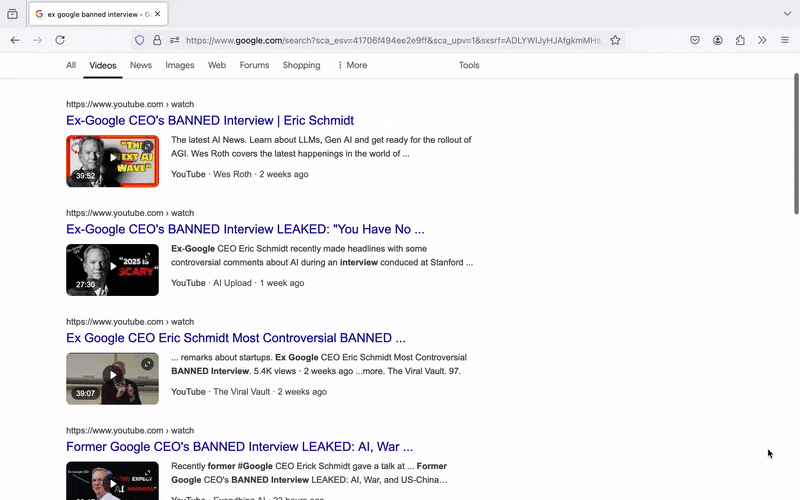Warning or Marketing? Ex-Google CEO Leaked Video Is Not-So-Clever Advertising
In recent headlines, former Google CEO Eric Schmidt has made waves with his alarming predictions about AI. While these warnings may seem like a public service, they are more likely a strategic marketing ploy designed to promote Google’s latest AI advancements. Schmidt, who continues to play a significant role at Google as a technical advisor and investor, isn’t just raising concerns—he’s positioning Google as the go-to solution.

Fear Sells: How Schmidt's Predictions Drive Google’s Marketing
Schmidt’s dramatic warnings about AI are strategically timed with Google’s upcoming product launches. This tactic leverages fear to generate interest and drive engagement. The media frenzy surrounding terms like “Ex-Google CEO leaked video” is amplifying these warnings, creating a sense of urgency that benefits Google’s bottom line. This approach is not new; sensationalism captures attention, and attention drives profit.
The screenshot below captures the results of a query for "ex Google banned interview." Notably, our search did not include terms like "CEO," "leaked," or "A.I." However, despite this, the first two pages of Google's search results prominently feature videos and content related to Eric Schmidt, former CEO of Google.

The search results are saturated with doomsday narratives, reinforcing a message that simultaneously promotes Google’s solutions and stokes public fear. This is a classic example of marketing masquerading as cautionary advice.
Herer are some other examples:
Media’s Role in Amplifying Sensationalism
The media plays a crucial role in perpetuating this cycle of sensationalism. By prioritizing provocative headlines and fear-driven content, media platforms attract viewers and clicks, often at the expense of nuanced analysis. This pattern mirrors the behavior seen on social media, where engagement is driven by controversy rather than substantive information.
Schmidt’s Doom Scenario: Oversimplifying to Market
Schmidt’s examples of AI creating apps on demand are simplified to the point of distortion. While the concept of an AI-generated app is intriguing, it’s presented in a way that benefits Google by highlighting their technology as the solution. This narrative minimizes the complexity of AI development and the availability of independent, privacy-focused alternatives.
Independent Developers: Innovating Beyond Big Tech
The capabilities Schmidt describes are not as groundbreaking as they seem. Independent developers have long been creating advanced applications, often surpassing mainstream solutions. The real issue is not the technology itself but the overshadowing of independent innovators by Big Tech’s marketing power.
Perspective: AI’s Dual Role
It’s important to recognize both the potential benefits and risks of AI. While Schmidt’s warnings focus on the risks, AI also offers significant opportunities for enhancing productivity and creativity. Our previous article, “A.I. Supports Human Intelligence, and Don’t Let Anyone Tell You Otherwise,” emphasizes AI as a tool that supports rather than replaces human intelligence. This balanced view is crucial for understanding AI’s role in a broader context.
Historical Context: Disruptions Past and Present
Schmidt’s comparison of AI’s impact to Google’s past disruptions, such as social media, is unclear. While Google has had a significant influence on various technologies, its role in social media is less direct. For instance, YouTube, while influential, did not initially dominate the social media landscape. A clearer historical comparison would provide better insight into how AI might disrupt current technologies.
America’s Web Club: A Call for Ethical Tech Solutions
America’s Web Club offers an alternative to Big Tech’s dominance, focusing on ethical and independent tech solutions. Unlike Schmidt’s model, which promotes dependency on Google’s infrastructure, America’s Web Club empowers users to maintain control over their data and applications. As Allison Coutain, founder of America’s Web Club, notes, “They lost their antitrust case because they’re always in the way.” Our platform supports independent development and privacy-focused web solutions, challenging the commercial dominance of large tech companies.
Take Action: Reclaim Your Digital Independence
Don’t let fear drive your tech choices. Schmidt’s warnings are designed to push users toward Google’s solutions, but alternatives are available. Explore America’s Web Club and other independent platforms that prioritize privacy and ethical practices. Empower yourself by building and managing your digital assets independently of Big Tech.
Discover how to take control of your digital world with America’s Web Club. Learn more about how AI supports human intelligence and embrace technology on your terms: A.I. Supports Human Intelligence, and Don’t Let Anyone Tell You Otherwise.
What's Your Reaction?






























_at_Hillsboro_Road_(Virginia_State_Route_690)_in_Hillsboro%2C_Loudoun_County%2C_Virginia.jpg/240px-thumbnail.jpg)












![Round One of 'Did You Know He Was...Whoite [sic]'](https://news.awc.ac/uploads/images/202409/image_430x256_66eb6319e5d76.jpg)















